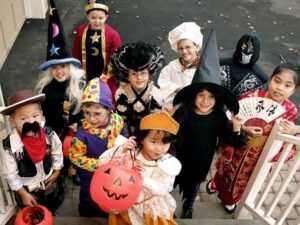Introduction
Halloween, a time of spooky costumes, eerie decorations, and candy-filled delights, is a holiday celebrated with fervor in many parts of the world. This article explores the origins, historical significance, and contemporary traditions associated with Halloween. From its Celtic roots to its modern manifestations, we will uncover the allure of this fascinating holiday and its significance in today’s culture.
The History of Halloween

Halloween’s history is a tale of ancient origins and rich traditions. It dates back over 2,000 years to the Celtic festival of Samhain, celebrated by the Celts in what is now Ireland, the United Kingdom, and northern France. Samhain marked the end of the harvest season and the beginning of winter, a period believed to be a time of thinning boundaries between the living and the dead. It was during Samhain that the Celts believed spirits and fairies could easily cross into our world.
Trick-or-Treating and Costumes
One of the most enduring traditions of Halloween is trick-or-treating. The practice of dressing in costumes and going door to door for treats can be traced back to the medieval European custom known as “souling.” In this tradition, the poor would go door to door, offering prayers for the deceased in exchange for food. In the United States, the modern form of trick-or-treating emerged in the early 20th century and has since become a beloved Halloween tradition.
The Pumpkin Connection
No Halloween is complete without the iconic Jack-o’-lantern. Originally, people in Ireland and Scotland carved turnips and potatoes, but upon arriving in North America, they adopted pumpkins for their carvings. The Jack-o’-lantern’s purpose is rooted in folklore, as it is believed to ward off evil spirits during Halloween.

Halloween Around the World
Halloween is most widely celebrated in the United States, where it has evolved into a multimillion-dollar industry. The U.S. boasts extravagant decorations, haunted houses, and a wide array of costumes. Other countries like the United Kingdom, Ireland, and Canada also celebrate Halloween, albeit to varying degrees.
In Mexico, the holiday has a different twist, known as Dia de los Muertos or Day of the Dead, which honors deceased loved ones with vibrant parades and colorful altars. In China, the festival of Teng Chieh is celebrated with offerings to the deceased, while Japan’s Obon Festival involves lanterns and a dance called Bon Odori to welcome back spirits.
Halloween Customs and Traditions
Bobbing for apples, a game with ancient Celtic roots, and the creation of “worry dolls” to dissipate concerns are examples of traditional Halloween customs. A more recent addition to the celebration is the haunted house attraction, offering a spine-tingling experience for thrill-seekers.

Superstitions surrounding black cats, bats, and witches are also prevalent during Halloween. It’s a time when people engage with supernatural themes, enjoying a touch of fear and wonder.
Halloween Today: A Multifaceted Celebration
Halloween has transformed over the centuries, evolving from an ancient Celtic festival to a commercialized, fun-filled holiday celebrated worldwide. Today, it is a fusion of tradition, myth, and imagination, offering a diverse range of activities for people of all ages.
The Global Commercial Impact
Halloween has grown into a massive commercial event. In the United States alone, it is a multi-billion-dollar industry encompassing costume sales, haunted attractions, and candy consumption. Retailers, both online and in physical stores, capitalize on the demand for Halloween-themed merchandise. The holiday provides a substantial boost to the economy.
The Social Aspect
Halloween brings communities together. Trick-or-treating, costume parties, and neighborhood decorations foster a sense of togetherness. It’s a time for friends and family to engage in creative activities, from designing costumes to carving pumpkins. Moreover, Halloween celebrations often include charity events, fundraisers, and community parades, emphasizing the importance of sharing the holiday spirit with others.
Conclusion
Halloween is a holiday with deep historical roots, celebrated in various ways across the globe. From its origins in Celtic traditions to the contemporary commercial juggernaut it has become, Halloween is a multifaceted celebration that continues to captivate people of all ages. It’s a time for creativity, community, and a little bit of fright, reminding us of the enduring power of myth, superstition, and the human imagination. As Halloween continues to evolve, its enchanting traditions will undoubtedly endure for generations to come.










